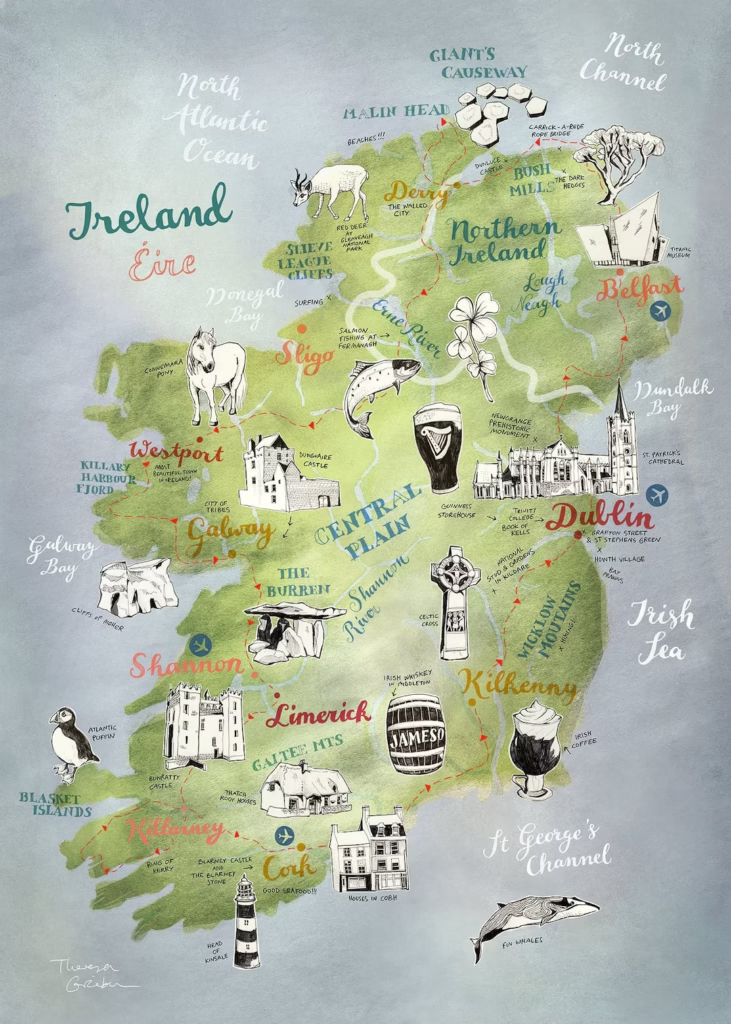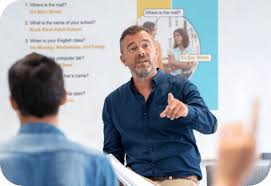- Maximise the Benefits of an Erasmus+ Programme as an Educator
- Understanding the Value of Erasmus+ for Educators
- Preparing for Your Erasmus+ Experience
- Making the Most of the Course
- Applying Your Learnings Back Home
- Overcoming Challenges
- Why Choose Erasmus Courses in Ireland?
- A Welcoming Environment for Growth
- Conclusion
Maximise the Benefits of an Erasmus+ Programme as an Educator

Participating in an Erasmus+ programme is a transformative opportunity for educators across Europe. Whether you’re a teacher in a primary school, a professor at a university, or a vocational training manager, Erasmus+ offers numerous ways to develop professionally, enhance your teaching methods, and foster international collaboration. This guide provides practical advice on making the most out of your Erasmus+ experience, from preparation to application in your educational environment.
Understanding the Value of Erasmus+ for Educators

The Erasmus+ programme, funded by the European Union, supports education, training, and collaboration across European institutions. It empowers educators to:
- Enhance teaching methods: Gain exposure to innovative teaching techniques and educational best practices that can rejuvenate classroom environments and improve learning outcomes.
- Network internationally: Build professional relationships with educators from different countries, fostering a collaborative spirit and sharing ideas for solving common educational challenges.
- Promote cultural exchange: Bring diverse perspectives back to your educational institution, which can help in creating a more inclusive and globally aware student body.
- Receive EU funding: Cover travel, accommodation, and course fees, making professional development more accessible and financially feasible for educators.
By participating in Erasmus+, educators can influence their institutions with new insights, strategies, and networks, driving positive change and innovation.

Preparing for Your Erasmus+ Experience
Proper preparation ensures that you gain the maximum benefits from your Erasmus+ programme. Taking the time to plan ahead will help you avoid unnecessary stress and make the most of the opportunity.
1. Set Clear Objectives
Before selecting a course or project, identify your learning and development goals:
- What specific teaching skills do you want to improve?
- Are there gaps in your curriculum that new methodologies can address?
- Do you want to foster international partnerships or focus on personal professional growth?
Having clear objectives will help you select the right programme and measure your success. Write down these goals and discuss them with colleagues or supervisors to gain additional perspectives.
2. Choose the Right Course and Location

When selecting a centre, consider factors such as:
- Accreditation and reputation: Ensure the institution is recognized and has a track record of delivering high-quality courses.
- Relevance of the course: Match the course content to your specific learning objectives.
- Accommodation and logistics: Ensure that the accommodation options are comfortable and well-located.
Ireland is an excellent destination for Erasmus+ courses, known for its vibrant academic environment and welcoming culture. Explore all of the courses that meet the highest academic and customer service standards.
Read more about our different courses on
- English Language & Professional Communication for Teachers, Academics & Managers
- Classroom Management and Methodology
- Teaching 21st Century Skills in the Digital Age
- CLIL – Content Language and Integrated Learning
- English Language and Irish Culture
3. Understand Funding Options
Erasmus+ funding covers essential expenses, but you need to apply early and submit accurate documentation. Work with your institution’s administrative team to ensure a successful application. Familiarize yourself with the documentation requirements and deadlines to avoid last-minute issues.
You can read more here in our useful guide “Maximizing Opportunities: A Comprehensive Guide to Erasmus+ Funding for English Language Education in Ireland” here:
Once your Erasmus+ programme begins, maximize your learning and networking opportunities by being proactive and engaged.
4. Complete Pre-Departure Preparation
Make sure you:

- Arrange travel and accommodation: Book flights and lodging well in advance to secure the best options.
- Prepare the necessary documents: Keep copies of your funding approval, course registration, and identification.
- Familiarize yourself with the course syllabus: Understand the topics and structure of the course to mentally prepare.
- Learn about the local culture: Understanding cultural norms will help you adapt more quickly and build better connections.
All of our centres provide guidance and supporting documents to simplify this process, making it easier to focus on your learning experience.
Making the Most of the Course
1. Engage Actively in Sessions
Active participation during sessions is crucial to extracting the full value from your Erasmus+ programme. Engaging actively allows you to internalize new concepts, make meaningful connections with other participants, and retain key insights.
- Ask questions and seek clarifications: Don’t hesitate to ask questions, whether they’re about course content or practical applications. Questions not only clarify your understanding but often lead to richer discussions that benefit everyone in the session.
- Example: If a teaching technique seems particularly innovative but challenging to apply in your context, inquire how it can be adapted for your classroom environment.
- Share your experiences: Contributing insights from your own teaching background helps create a dynamic learning environment. It provides valuable perspectives for both trainers and fellow participants.
- Example: Describe how you handle student engagement in your current role and ask others for suggestions or alternative approaches.
- Take detailed notes: Writing down key points, ideas, and examples allows you to review and implement what you’ve learned later. Organize your notes by themes or categories to make them easier to reference.
- Tip: Highlight actionable strategies that you want to prioritize upon returning to your institution.
- Participate in group activities and discussions: Group activities often simulate real-world educational scenarios. Engage fully to gain practical insights and collaborative problem-solving skills.
- Provide constructive feedback: Offering thoughtful feedback to facilitators and peers can enrich the learning experience for everyone.
- Stay mentally present: Avoid distractions and immerse yourself fully in the learning process. This focused approach ensures you absorb as much knowledge as possible.
Active engagement ensures that you retain more information, build strong professional networks, and develop practical strategies to apply in your educational environment. Remember, your participation not only benefits you but also enriches the learning experience for your peers.
2. Network with Fellow Educators
Building professional connections is one of the key benefits of Erasmus+. Networking during and after the programme can lead to future collaborations, exchange of ideas, and long-term professional growth.
- Consider collaborative projects: Brainstorm ways to work together beyond the programme. Collaborative efforts could range from joint research projects to student exchange programmes or co-hosted educational events.
- Engage in online communities: Many Erasmus+ alumni groups and forums are available online. Participate actively to stay updated on developments, funding opportunities, and best practices.
Networking can lead to long-term professional relationships and opportunities. A single conversation during a coffee break or social event can spark ideas that lead to meaningful collaborations and lasting friendships.
3. Explore Cultural Opportunities
Cultural experiences provide valuable perspectives that can enrich your teaching. Immersing yourself in the local culture offers insights into different ways of thinking, problem-solving, and engaging with educational content.
- Visit local educational institutions: Gain insights into different educational practices and philosophies. Observing how other schools operate can provide ideas for improving your own institution’s processes.
- Immerse yourself in local life: Try local cuisine, attend cultural performances, and engage with the community. Experiencing daily life in a different cultural context can spark new ideas for creating inclusive learning environments.
- Document cultural insights: Take note of cultural observations that could be integrated into your teaching. For example, you might learn about unique classroom management techniques or creative approaches to student engagement.
These experiences can broaden your worldview and inspire new teaching ideas, making you a more dynamic and culturally aware educator.
Want to learn more about Dublin, Cork and Galway where our training centres are located? Read more on the best things to do in our helpful blogs:
4. Document Your Learning
Keeping a record of your learning experiences during the Erasmus+ programme ensures that you can revisit key insights and share them with your colleagues.
- Key insights and ideas: Record what resonates with you most during sessions. Jot down specific techniques, strategies, or perspectives that stand out.
- Innovative teaching strategies: Note methods that could be adapted to your classroom. Pay attention to ideas that challenge traditional teaching norms and explore how they might fit your educational setting.
- Suggestions for application: Outline actionable steps to implement these ideas. Create a plan for testing new approaches and measure their impact on student learning.
- Create multimedia records: Take photos, videos, and audio notes if appropriate. Visual and audio records can capture the essence of workshops and discussions better than written notes alone.
- Organize your notes: Use digital tools like Evernote or OneNote to organize your notes by themes, sessions, or actionable categories.
Having a detailed record will help you retain information and share it effectively with colleagues. Well-documented experiences can also serve as a valuable reference for future professional development initiatives.
Applying Your Learnings Back Home
Applying Your Learnings Back Home
The true value of Erasmus+ lies in transforming your experiences abroad into meaningful, lasting changes in your teaching practice and educational institution.
1. Share Knowledge with Colleagues
Upon returning, one of the most impactful steps you can take is to disseminate your knowledge:
- Create resource guides: Develop easily accessible documents, such as guides or toolkits, highlighting key teaching methods or technologies you explored during Erasmus+. Include practical tips and examples for immediate application.
- Encourage innovation: Initiate a culture of continuous learning by sparking conversations about teaching innovations you observed. Inspire colleagues to experiment with fresh approaches.
💡 Pro Tip: Consider starting a professional learning community where educators meet regularly to exchange ideas and reflect on teaching practices inspired by Erasmus+.
2. Integrate New Teaching Methods
One of the most rewarding ways to leverage your Erasmus+ experience is by evolving your teaching strategies:
- Update lesson plans: Identify areas where you can integrate new methodologies, such as inquiry-based learning, collaborative exercises, or experiential activities.
- Incorporate diverse perspectives: Highlight international case studies, cultural examples, and viewpoints in classroom discussions to build global awareness and empathy among students.
- Use technology: Experiment with digital tools you discovered, such as gamified learning platforms or collaborative apps.
- Foster a multicultural mindset: Create learning experiences that encourage curiosity about global issues and diverse cultural contexts.
💡 Pro Tip: Pilot new methods with one class or project, then expand based on student feedback and engagement levels.
3. Collaborate on International Projects
Your Erasmus+ network offers endless opportunities for meaningful collaboration:
- Develop joint research projects: Explore common educational challenges and collaborate on research that advances teaching practices across borders.
- Participate in educational initiatives: Join or spearhead international projects aimed at addressing educational equity, sustainability, or innovation in teaching methods.
💡 Pro Tip: Use communication tools such as virtual conferencing platforms and online project management apps to keep international collaborations streamlined and effective.
4. Evaluate and Reflect
Sustainable growth requires ongoing evaluation and reflection:
- Assess changes in student engagement: Use classroom observations, assignments, and student interactions to gauge the impact of your new approaches.
- Collect feedback: Actively seek input from students and colleagues to understand the effectiveness of changes and identify areas for improvement.
- Document successes and challenges: Keep a journal or portfolio of your Erasmus+ journey, documenting lessons learned, successful practices, and areas for development.
💡 Pro Tip: Share your reflections in professional networks or educational conferences, inspiring others to consider Erasmus+ opportunities.
By sharing knowledge, integrating innovative methods, collaborating internationally, and reflecting thoughtfully, your Erasmus+ experience can create lasting, positive change in your educational community.
Overcoming Challenges
While Erasmus+ is a highly rewarding experience, it’s not without its challenges. By preparing ahead and maintaining a positive mindset, you can overcome any obstacles that arise and make the most of your time abroad.
1. Language Barriers
Even though many courses are conducted in English, communication challenges may still occur, especially during informal interactions or when engaging with local communities.
- Brush up on language skills: Before your departure, consider enrolling in short language courses or using language learning apps like Duolingo, Babbel, or Memrise. Focus on common phrases and educational terminology.
- Use translation tools: Apps like Google Translate or Microsoft Translator can assist with written and spoken communication in real time.
- Non-verbal communication: Don’t underestimate the power of gestures, facial expressions, and visual aids in conveying meaning when words fall short.
💡 Pro Tip: Embrace the opportunity to practice the local language even if you’re not fluent. Locals often appreciate the effort and may be more willing to assist you.
2. Cultural Differences
Navigating cultural differences can be both enlightening and challenging. Differences in communication styles, expectations, or teaching methods may arise.
- Approach with openness: Be curious and respectful when encountering new customs or ways of doing things. Ask questions and seek to understand rather than judge.
- Embrace diverse viewpoints: Use these differences as learning opportunities. Incorporate insights gained from cultural interactions into your teaching to promote inclusivity and global awareness.
- Adapt your communication style: Pay attention to verbal and non-verbal cues. Some cultures may value direct communication, while others may lean toward a more indirect approach.
💡 Pro Tip: Engage in cultural activities and events during your stay. This will deepen your understanding of local traditions and create stronger connections with the community.
3. Balancing Responsibilities
Managing your professional responsibilities while attending Erasmus+ activities can be overwhelming without proper planning.
- Plan your schedule: Well in advance, communicate your Erasmus+ dates with school administrators and colleagues. Arrange for class coverage or modify your teaching schedule if possible.
- Create detailed lesson plans: Provide your substitute teacher with structured lesson plans and resources to ensure minimal disruption for students.
- Delegate tasks: Empower trusted colleagues to temporarily handle administrative or extracurricular responsibilities.
- Stay organized: Use scheduling tools to manage deadlines for both your Erasmus+ programme and ongoing responsibilities back home.
💡 Pro Tip: Stay connected with your school via email or messaging platforms to address urgent issues without being constantly tethered to work.
By addressing these challenges head-on, you can ensure a smoother and more enriching Erasmus+ experience. Remember, growth often comes from stepping outside your comfort zone and finding creative solutions to obstacles along the way.
Why Choose Erasmus Courses in Ireland?
Ireland stands out as a premier destination for Erasmus+ participants, offering an exceptional combination of world-class education, cultural richness, and warm hospitality. Here’s why your Erasmus+ journey should lead you to Ireland:
1. Accredited Centres
Our training centres adhere to the highest Erasmus+ academic and service standards, ensuring a top-tier learning experience.
- Quality Assurance: All programmes undergo rigorous evaluations to maintain educational excellence.
- Tailored Learning: Courses are designed to meet the diverse needs of educators, whether you’re seeking new teaching methodologies or innovative leadership strategies.
💡 Pro Tip: Check out our specialized courses in digital innovation and inclusive education for cutting-edge insights.
2. Expert Educators
Gain valuable insights from experienced professionals who are passionate about empowering educators.
- Innovative Teaching Methods: Our educators bring fresh approaches grounded in both theory and practical classroom application.
- Collaborative Learning Environment: Engage in dynamic discussions and interactive sessions that encourage idea-sharing and peer collaboration.
💡 Pro Tip: Don’t hesitate to network with fellow educators during the courses — the exchange of ideas can be just as valuable as the formal training itself.
3. Cultural Programmes
Experience Ireland’s vibrant culture while enhancing your professional skills.
- Heritage Exploration: Visit iconic landmarks like the Cliffs of Moher, Trinity College, and historic castles.
- Immersive Cultural Activities: Participate in traditional Irish music sessions, storytelling evenings, and local craft workshops.
- Cultural Reflection: Gain a deeper understanding of how cultural contexts shape education and learning environments.
💡 Pro Tip: Join guided excursions to gain historical and cultural insights that you can incorporate into your teaching practice.
4. Comprehensive Support
Our centres provide seamless support throughout your Erasmus+ journey, allowing you to focus on learning and growth.
- Application Assistance: Get step-by-step guidance on Erasmus+ funding and application procedures.
- Accommodation Arrangements: Enjoy comfortable and conveniently located housing options tailored to your preferences.
- Ongoing Support: Our dedicated teams are available to assist with any queries before, during, and after your programme.
💡 Pro Tip: Take advantage of networking events and informal gatherings organized by the support team to connect with other participants and build lasting professional relationships.
A Welcoming Environment for Growth
Ireland’s reputation for warmth and hospitality creates the perfect backdrop for professional development. Its strong educational infrastructure, combined with its culturally enriching environment, ensures a transformative learning experience that goes beyond the classroom.
Choose Erasmus Courses in Ireland for a journey that blends professional growth with cultural discovery, leaving you inspired, enriched, and ready to make an impact in your educational community.
Conclusion
Maximizing the benefits of an Erasmus+ programme requires careful planning, active participation, and thoughtful application of your learnings. By setting clear objectives, engaging fully, and sharing knowledge upon your return, you can make a lasting impact on your teaching and institution.
Ready to embark on a transformative educational journey? Explore our Erasmus+ courses in Ireland and discover how we can help you achieve your professional development goals.
https://erasmuscoursesireland.eu/courses/
Embarking on an Erasmus+ programme is more than just an educational venture—it’s a transformative experience that shapes your professional and personal growth. The opportunity to exchange ideas, gain fresh perspectives, and learn in new environments empowers you to become a more innovative and culturally aware educator. The time you invest in this journey pays dividends in your teaching and in the lives of your students. By fostering an open mindset, building relationships, and integrating what you’ve learned, you can create a dynamic and enriching educational experience.
If Ireland sounds like the right fit for your next Erasmus+ experience, we invite you to take the leap. With our comprehensive courses, expert guidance, and welcoming culture, we strive to make your learning journey as seamless and impactful as possible.
